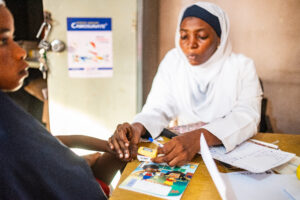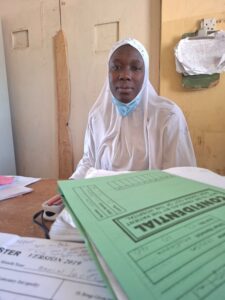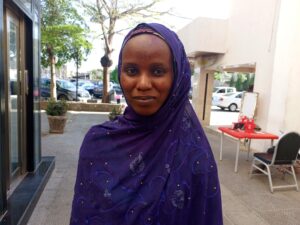Giving health workers the tools they need to put an end to malaria, once and for all
This is a guest post from Malaria Consortium, an international non-profit organisation specialising in the comprehensive control of malaria and other communicable diseases – particularly those affecting children under five.

One patient, in particular has, stuck with Saidat Usman. A woman was admitted with severe malaria to Kura General Hospital in Kano state, Nigeria, where Usman works as a nurse. The woman’s husband had been frustrated by previous unsuccessful attempts to treat his wife’s malaria and demanded she be discharged to receive traditional treatment instead.
Usman pleaded with him to allow them to treat his wife, but he refused. Eventually, Usman managed to convince the woman’s grandfather over the phone to let them proceed. The patient received a blood transfusion and treatment with artesunate, a medication used to treat severe malaria. “Within 24 hours, she showed a remarkable improvement and was back on her feet,” Usman says. Her husband, amazed by her recovery, asked what they had done differently and Usman explained that, since the last time his wife has been treated, this time they were following protocols that had been updated and improved.

These protocols have been designed and implemented under the Severe Malaria project, an initiative run by Malaria Consortium since 2022 in Kano state in northern Nigeria. Run in collaboration with the State Malaria Elimination Programme (SMEP), the initiative is strengthening how severe forms of malaria are diagnosed and managed. ‘Severe malaria’ refers to cases where a malaria infection progresses to the point of being life-threatening, characterised by vital organ dysfunction, and requires rapid treatment.
Witnessing preventable deaths due to improper treatment motivated Usman to advocate for improved case management practices. Today, she volunteers to lead improvements in her hospital as a malaria champion of change. “Since the project’s introduction, there has been a remarkable improvement in malaria diagnosis, treatment and overall case management,” she says. Since the project was rolled out, there hasn’t been a single death due to severe malaria recorded.
The power lies in the people. The project is one of many aimed at empowering health workers with the skills and expertise they need to tackle malaria. This not only means they can treat malaria more confidently, but it also ensures many more lives are saved from this devastating disease. When frontline workers are equipped with the right tools and training, entire communities stand a better chance of surviving and thriving in the face of disease.
A recent decline of international aid in the form official development assistance for health means the ability to provide vital training and resources is compromised, ultimately putting lives at stake, and the progress that has been made so far is at immediate risk of being lost. Through embedding these skills and expertise at a local level, health systems become more resilient. Putting an end to malaria starts with countries being able to fight the fight themselves, minimising reliance on external support. Nigeria carries one of the largest burdens of malaria in the world. It accounted for over a quarter of all cases in 2023, and almost a third of all malaria deaths. The threat of malaria has only risen in recent years, with Nigeria’s caseload mushrooming by 6.8 million between 2019 and 2023. The reason for this worsening problem is a perfect storm of factors: ideal vegetation grounds for mosquito breeding, and inadequate sanitation management.
Other issues are actively exacerbating the situation: a changing climate is increasing the transmission of the disease, and mosquitoes are developing resistance to existing therapeutics and insecticides. Before the project’s implementation, according to Kadijat Yusuf Ibrahim, a medical laboratory scientist at Walshur Specialist Hospital, negative cases of severe malaria were often treated unnecessarily with medications, which contributes to the growing issue of drug resistance. This was because they were going initially off signs and symptoms, rather than using precise testing methods to correctly diagnose a case. With the new training offered by Malaria Consortium, “the survival and recovery rates have improved significantly, and resistance to treatment has reduced to the barest minimum,” she says.

Prevention is the prescription
Another area of Malaria Consortium’s work aimed at curbing the development of antimalarial drug resistance is the PMC Effect study. In Nigeria, malaria is the leading cause of death among children under five years of age, resulting in over 95,000 deaths from malaria annually. In Osun state in southwestern Nigeria, perennial malaria chemoprevention (PMC) is being rolled out to address this burden.
PMC is a strategy that involves giving young children monthly doses of antimalarial medicine, beginning just after birth and continuing through the most vulnerable early years of their life. The goal of Malaria Consortium’s collaboration with the government is to collect evidence that would support the integration of PMC into Nigeria’s national malaria control policy, where it is currently not a recommended policy. The uptake of PMC is held back by several barriers: a belief in traditional medicine, misconceptions about the medicine among caregivers, and negative perceptions among health workers. Oyelere Bukola, a State Health Educator at the Ministry of Health in Osun State, knew this all too well. “Many residents, including some health workers had limited knowledge about malaria prevention,” she says. The common practice was simply to visit a health facility or a patent medicine store to purchase malaria medicines, often without proper diagnosis or understanding. However, this programme has brought a significant shift. We now have improved knowledge of malaria prevention, and we are actively disseminating this information within our communities. The impact of this awareness is already being felt across the state.”
Part of this work has involved community dialogue sessions, in which people receive education on the importance of recognising symptoms, getting tested before treatment, and avoiding self-medication and the use of herbs. “As a result, the reliance on traditional remedies has significantly declined, thanks to continuous sensitisation effort,” says Bukola.
So far, the project has delivered PMC to over 12,000 children. It has also trained 411 health workers and engaged with 144 caregivers.
Part of the effectiveness of the programme, according to Dr Olufem Oroge, the Programmes Manager for the Osun State Malaria Elimination Programme, has been impressing on health workers that antimalarial drugs exist not only to treat an active case of malaria, but can actually prevent the disease from developing. “This shift in understanding has marked a significant advancement in malaria control efforts, enabling health workers to deliver care that is both proactive and evidence-based,” he says. “As a result, there is a growing culture of prevention within the healthcare system, and a renewed commitment to protecting young children from the devastating effects of malaria before it strikes.”
What’s more, he says, “health workers now understand the importance of diagnosis before treatment. The difference between preventive medicines and those for treatment have well been mastered and used by the health workers who, before now, may not have known. That is, they know that the medicines for prevention cannot be used for treatment and [vice versa]. Treatment by assumption or based on signs and symptoms is no longer the case in Osun state.” That means cases of malaria are not treated unnecessarily, which also helps to suppress the development of antimalarial resistance.”
From aid to action
On World Malaria Day this year, the impact of Malaria Consortium’s work in Nigeria is a powerful reminder that progress against this deadly disease doesn’t come from breakthroughs alone — it comes from people. It comes from health workers like Saidat Usman who refuse to give up on a patient, from lab scientists who sharpen their skills to make faster, more accurate diagnoses, and from communities beginning to embrace prevention as power. It shines a light on the importance of giving local governments the tools and technical skills to carry out their own malaria control and elimination efforts.
With every training session, every conversation, and every life saved, these efforts are not just changing how malaria is treated — they’re changing the future. And in places where malaria has long cast a shadow, that future is beginning to look brighter.
